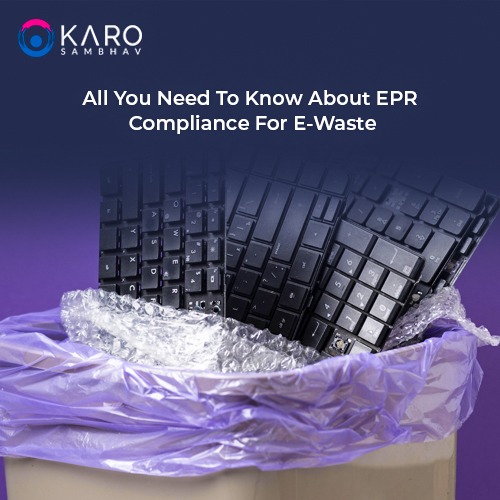All You Need To Know About EPR Compliance For E-Waste
A key component of waste management is Extended Producer Responsibility (EPR), especially when it comes to electronic waste (e-waste), which is expanding quickly as a result of the widespread use of electronic devices. In order to mitigate the risks to the environment and public health that arise from the inappropriate disposal of e-waste, EPR compliance is essential. Everything you need to know about e-waste EPR compliance is provided below -
1. Comprehending EPR Compliance: Extended Producer Responsibility (EPR) is a policy approach in which product importers, manufacturers, and brand owners assume accountability for managing the lifecycle of their items, encompassing collection, recycling, and appropriate disposal. EPR compliance encourages sustainable practices and lessens the load on communities and governments by requiring producers to finance and oversee the end-of-life disposal of their products.
2. Importance of EPR for E-Waste Management: Since e-waste contains dangerous materials including lead, mercury, and cadmium, it poses serious dangers to human health and the environment. When e-waste is improperly disposed of, communities may experience negative health effects, air pollution, and contaminated soil and water. EPR for e-waste makes ensuring that manufacturers are accountable for controlling the disposal of their goods, encouraging recycling and appropriate handling to reduce environmental effects.
3. Legal Framework for EPR Compliance: A number of nations have put laws into place requiring EPR compliance for the handling of electronic waste. Producer obligations are delineated by these regulations, encompassing registration, reporting, and funding of collection and recycling initiatives. Producers must adhere to strict guidelines set by regulatory bodies, which are enforced and monitored, regarding the collection of e-waste, recycling rates, and environmental requirements.
4. EPR Compliance Benefits: There are several advantages to EPR compliance, such as -
i) Environmental Protection: Recycling and resource recovery are encouraged when e-waste is managed properly, which lowers pollution levels and preserves natural resources.
ii) Health and Safety: By preventing workers and communities from being exposed to toxins, EPR compliance reduces the health hazards related to hazardous elements in e-waste.
iii) Resource Efficiency: By recycling e-waste, you can save precious resources including rare earth elements, metals, and polymers. This lowers your need for new materials and your energy usage.
iv) Circular Economy: By supporting sustainable patterns of consumption and production, EPR facilitates the shift to circular economy by promoting product reuse, repair, and recycling.
5. Opportunities and Challenges: Although EPR consulting has many advantages, there are still obstacles to overcome. These include making sure that producers are held accountable, setting up effective infrastructure for collection and recycling, and dealing with unofficial e-waste recycling techniques. EPR, however, also offers chances for creativity, funding, and cooperation throughout the e-waste value chain, promoting long-term fixes and economic expansion.
To sum up, managing electronic waste requires EPR compliance to handle the mounting risks to the environment and public health that come with it. EPR encourages sustainability, resource efficiency, and environmental protection by holding manufacturers responsible for the lifecycle management of their products. This helps to leave the earth cleaner and healthier for coming generations.


Thank you for sharing informative article. Keep Sharing with us. Read about EPR Compliance For Battery Waste Management here.
ReplyDelete